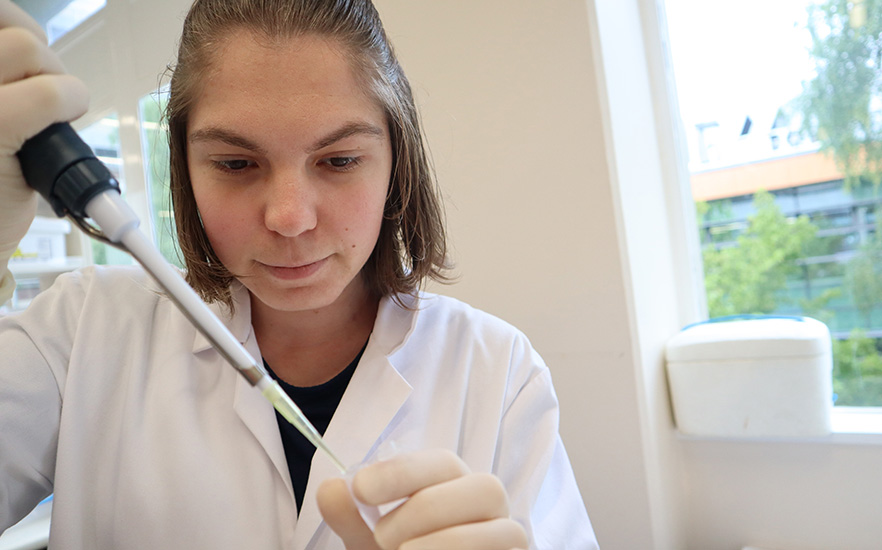
Jennifer Palmer in the laboratory.
Curious child, decorated student, cancer survivor, marathon runner, volunteer and soon-to-be Cambridge University PhD student. Sometimes people's stories leave us with gaping jaws.
So it is with Jennifer Palmer, 22, a young woman who has lived an incredible life already, with so much more to come.
An academic prize winner at high school in Whangaparaoa, and as the University of Otago's top undergraduate in 2019, Ms Palmer graduated from Otago this month with a Bachelor of Science (Honours) in Biochemistry. She will soon hop on a plane to England, where she will begin her PhD at Cambridge University.
That is thanks to her winning the prestigious Cambridge-Rutherford Memorial PhD Scholarship, from the Royal Society Te Aparangi's Rutherford Foundation. It provides full support to enable completion of a PhD at the University of Cambridge in pure or applied science and the social sciences. Her PhD will investigate neurodegenerative disease.
These achievements have come despite her being diagnosed and treated for Hodgkin's lymphoma during her undergraduate studies. She won that fight, and after getting the news she was in full remission last year, she completed the Dunedin Marathon.
Ms Palmer says her success, as far as she can tell, is a symptom of her questioning nature.
“I was the annoying kid who asked a lot of questions and was never satisfied with an incomplete answer. Thankfully, I never grew out of that phase, and my curiosity and love of learning new things is still behind a lot of what I do.
“After my Grandma's experience with vascular dementia, and my own experience with lymphoma, I've also seen the importance of research to improve outcomes, and remembering the people who will benefit from the research that we do has helped keep me focused and determined.”
But there has been more to books and formulas in Ms Palmer's time at Otago – her extracurricular activities have been numerous and varied. She says life “would be boring” if she didn't fill it with activities.
“I can't say no to an opportunity that sounds like fun or where I think I can make a difference. Creative outlets and the outdoors help me to de-stress, and I really enjoy the activities I get up to and the wonderful people I meet. I find that friendships formed while waiting out a storm in a backcountry hut, or getting soaked by waves on bowsprit of a ship, are friendships that tend to stay strong.”
Referencing the people she has met is something Ms Palmer does frequently.
“I've been extremely fortunate to be surrounded by amazing and supportive people, especially during my time at uni. I wouldn't be the same person without my tramping club friends, flatmates, friends from my hall, science students association, classmates, lab group and department.
“I'm also very grateful to everyone who put up with my excessive curiosity as a child and helped to foster it rather than quash it.”
That excessive curiosity is now going to drive her to work towards her “perfect future” - where disease-modifying therapies exist for all neurodegenerative diseases, and are available to everyone who wants them.
“That is a huge ask, but I'm hoping that the increased collaborations in neurodegenerative disease research and the breadth of research taking place will make it possible. Success for me would be to contribute to this in some way and be able to share the joy of research with other researchers coming through the field.”
If such ambitions make Ms Palmer seem unreachable to other young people, she has some advice for them. The trick is in being guided by what excites you, not what excites others, she says.
“Follow your passions and focus on where you want to make a difference, which doesn't have to be what everyone expects you to do. People tried to push me into clinical medicine early on, but I knew I preferred the scientific research side, and if I hadn't followed my interests I wouldn't be where I am today.
“And don't be afraid to take on hobbies you're bad at but enjoy - learning how to put your perfectionism away for a while and just have fun is probably one of the biggest lessons I've learned.”
Ms Palmer has never been to the UK before, and says she is looking forward to what will be “a bit of an adventure” with new people to meet, new friendships to form, exciting research and “taking some time to explore the countryside”.
But Dunedin may not have seen the last of her, she says.
“I'll greatly miss the incredible people here and beautiful South Island national parks. I'm definitely aiming for this to not be a permanent goodbye to Dunedin and New Zealand – more of a ka kite anō than an e noho rā!”
For more information, contact:
Craig Borley
Communications Adviser
Division of External Engagement
University of Otago
Tel +64 3 479 4144
Mob +64 21 279 4144
Email craig.borley@otago.ac.nz
Find an Otago Expert
Use our Media Expertise Database to find an Otago researcher for media comment.